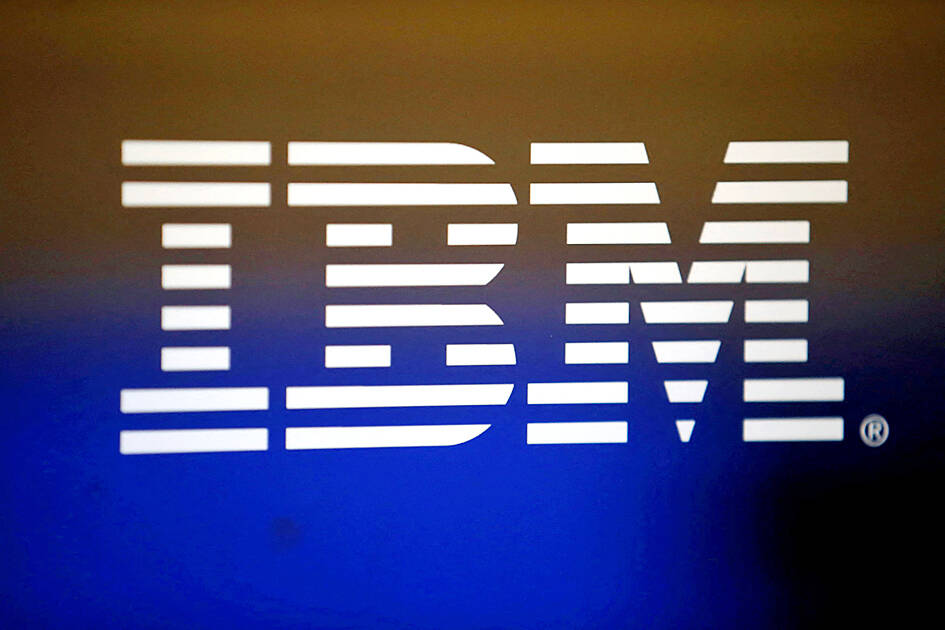International Business Machines Corp (IBM) chief executive officer Arvind Krishna said that the company expects to pause hiring for roles it thinks could be replaced with artificial intelligence (AI) in the coming years.
Hiring in back-office functions — such as human resources — would be suspended or slowed, Krishna said in an interview.
These noncustomer-facing roles amount to about 26,000 workers, he said.

Photo: Reuters
“I could easily see 30 percent of that getting replaced by AI and automation over a five-year period,” he said.
That would mean about 7,800 jobs lost.
Part of any reduction would include not replacing roles vacated by attrition, an IBM spokesperson said.
As AI tools have captured the public imagination for their ability to automate customer service, write text and generate code, many observers have worried about their potential to disrupt the labor market.
More mundane tasks such as providing employment verification letters or moving employees between departments would likely be fully automated, Krishna said.
Some human resources functions, such as evaluating workforce composition and productivity, probably would not be replaced over the next decade, he added.
IBM employs about 260,000 workers and continues to hire for software development and customer-facing roles.
Finding talent is easier today than a year ago, Krishna said.
The company announced job cuts earlier this year, which might amount to about 5,000 workers once completed.
Still, Krishna said that IBM has added to its workforce overall, bringing on about 7,000 people in the first quarter.
Armonk, New York-based IBM topped profit estimates in its most recent quarter due to expense management, including the earlier-announced job cuts.
New productivity and efficiency steps are expected to drive US$2 billion a year in savings by the end of next year, chief financial officer James Kavanaugh said on the day of earnings.

Vincent Wei led fellow Singaporean farmers around an empty Malaysian plot, laying out plans for a greenhouse and rows of leafy vegetables. What he pitched was not just space for crops, but a lifeline for growers struggling to make ends meet in a city-state with high prices and little vacant land. The future agriculture hub is part of a joint special economic zone launched last year by the two neighbors, expected to cost US$123 million and produce 10,000 tonnes of fresh produce annually. It is attracting Singaporean farmers with promises of cheaper land, labor and energy just over the border.

US actor Matthew McConaughey has filed recordings of his image and voice with US patent authorities to protect them from unauthorized usage by artificial intelligence (AI) platforms, a representative said earlier this week. Several video clips and audio recordings were registered by the commercial arm of the Just Keep Livin’ Foundation, a non-profit created by the Oscar-winning actor and his wife, Camila, according to the US Patent and Trademark Office database. Many artists are increasingly concerned about the uncontrolled use of their image via generative AI since the rollout of ChatGPT and other AI-powered tools. Several US states have adopted

A proposed billionaires’ tax in California has ignited a political uproar in Silicon Valley, with tech titans threatening to leave the state while California Governor Gavin Newsom of the Democratic Party maneuvers to defeat a levy that he fears would lead to an exodus of wealth. A technology mecca, California has more billionaires than any other US state — a few hundred, by some estimates. About half its personal income tax revenue, a financial backbone in the nearly US$350 billion budget, comes from the top 1 percent of earners. A large healthcare union is attempting to place a proposal before

KEEPING UP: The acquisition of a cleanroom in Taiwan would enable Micron to increase production in a market where demand continues to outpace supply, a Micron official said Micron Technology Inc has signed a letter of intent to buy a fabrication site in Taiwan from Powerchip Semiconductor Manufacturing Corp (力積電) for US$1.8 billion to expand its production of memory chips. Micron would take control of the P5 site in Miaoli County’s Tongluo Township (銅鑼) and plans to ramp up DRAM production in phases after the transaction closes in the second quarter, the company said in a statement on Saturday. The acquisition includes an existing 12 inch fab cleanroom of 27,871m2 and would further position Micron to address growing global demand for memory solutions, the company said. Micron expects the transaction to